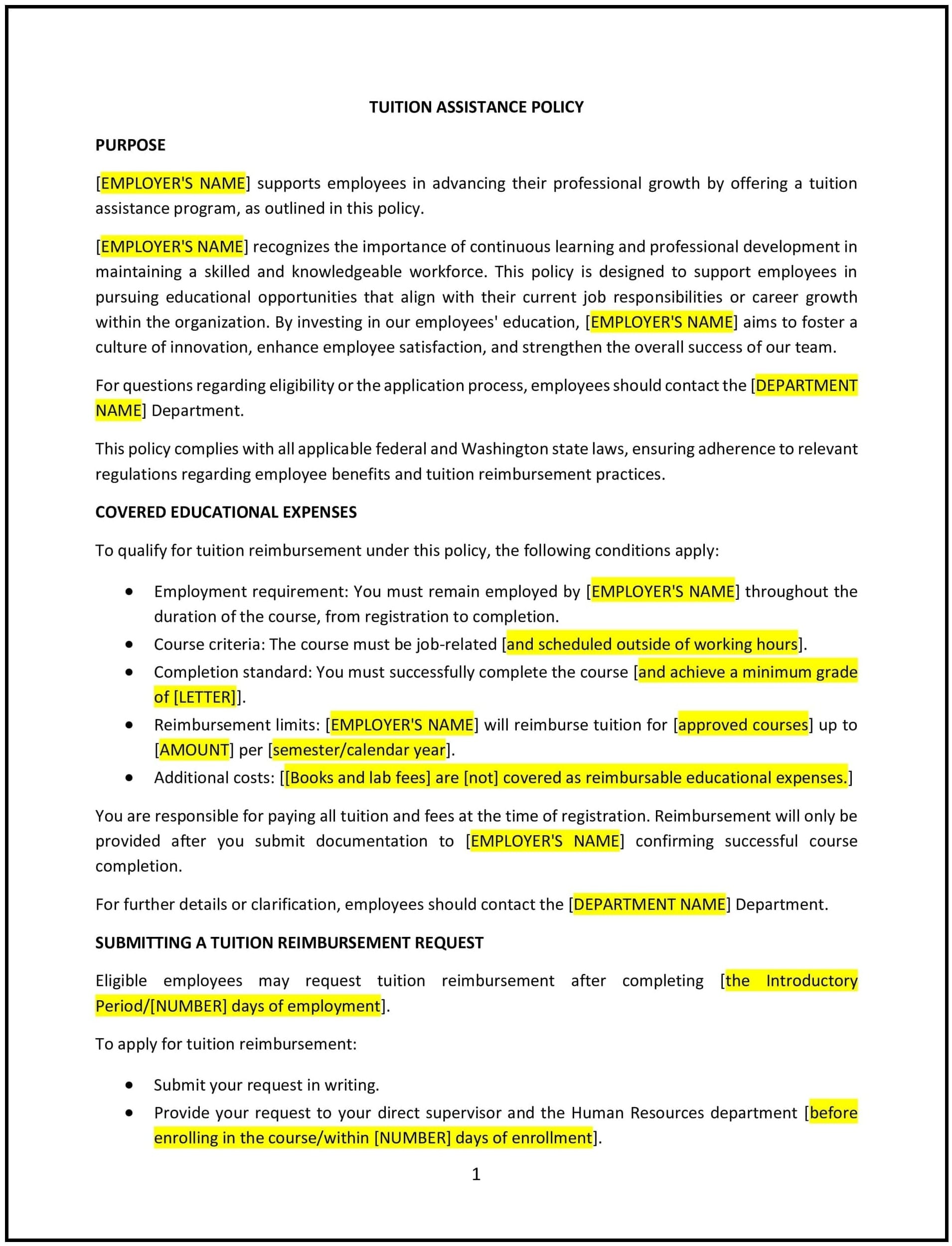Tuition assistance policy (Washington): Free template
Got contracts to review? While you're here for policies, let Cobrief make contract review effortless—start your free review now.

Customize this template for free
This tuition assistance policy is designed to help Washington businesses provide financial support for employees who wish to pursue higher education or job-related training. The policy outlines the eligibility criteria for employees, the types of educational programs that qualify for assistance, and the process for applying for tuition reimbursement. By adopting this policy, businesses can promote employee development, enhance skill-building, and create a more skilled workforce.
By offering tuition assistance, businesses can demonstrate their commitment to employee growth, improve retention rates, and help employees further their careers while benefiting the organization.
How to use this tuition assistance policy (Washington)
- Define eligibility criteria: The policy should clearly define who is eligible for tuition assistance, including any requirements such as minimum tenure, performance standards, or specific job roles that benefit from educational development. It should also specify whether the policy applies to full-time or part-time employees.
- Specify eligible educational programs: The policy should list the types of educational programs that qualify for tuition assistance, such as undergraduate degrees, graduate degrees, professional certifications, and job-related training. It should also clarify whether courses must be related to the employee’s current position or if broader educational programs are eligible.
- Set tuition reimbursement limits: The policy should define the maximum amount of tuition assistance available to employees, such as an annual or lifetime cap. It should also specify whether the assistance covers only tuition fees or if other expenses, such as textbooks or course materials, are eligible for reimbursement.
- Establish the application process: The policy should outline the steps employees need to take to apply for tuition assistance, including the required documentation, approval process, and deadlines for submission. It should ensure that employees understand the timeline and expectations for requesting assistance.
- Specify reimbursement procedures: The policy should explain how and when employees will be reimbursed for eligible tuition expenses. This includes outlining the requirements for submitting receipts, proof of course completion, and grades. The policy should also specify whether reimbursement is provided before or after completing the course.
- Address performance requirements: The policy may include performance requirements for reimbursement, such as a minimum grade point average (GPA) or successful completion of the course. It should clarify whether reimbursement is contingent on achieving certain academic standards.
- Ensure compliance with Washington state laws: The policy should ensure compliance with relevant Washington state laws, including those related to employee rights and tax implications of tuition assistance. It should also address any federal tax regulations regarding educational assistance programs.
- Review and update regularly: Periodically review and update the policy to ensure it remains compliant with Washington state laws, federal regulations, and any changes in company operations. Regular updates will help ensure the policy stays relevant and effective.
Benefits of using this tuition assistance policy (Washington)
This policy offers several benefits for Washington businesses:
- Promotes employee development: By providing tuition assistance, businesses help employees develop new skills and knowledge that can enhance their job performance and career growth.
- Increases employee retention: Offering tuition assistance demonstrates the company’s investment in employees’ future, leading to greater job satisfaction, loyalty, and long-term retention.
- Supports a skilled workforce: The policy helps ensure that employees have the skills needed to perform their roles effectively and contribute to the company’s overall success.
- Enhances company reputation: A company that offers educational assistance programs is viewed positively by employees and potential recruits. It enhances the company’s reputation as a supportive employer who values employee growth and development.
- Reduces turnover costs: By investing in employees’ education, businesses can reduce turnover and the costs associated with hiring and training new employees. Employees who feel supported are more likely to stay with the company long term.
- Encourages a culture of learning: Implementing this policy helps foster a culture of continuous learning and development, which can improve overall company performance and competitiveness in the marketplace.
Tips for using this tuition assistance policy (Washington)
- Communicate the policy clearly: Ensure that all employees are aware of the tuition assistance policy and understand how to apply for assistance. Include the policy in the employee handbook, review it during onboarding, and provide periodic reminders.
- Provide guidelines for selecting programs: Help employees identify educational programs that align with their job responsibilities and career goals. Encourage them to select courses that will enhance their skills and benefit the company.
- Set clear approval processes: Make sure the approval process for tuition assistance is clearly defined and efficient. Employees should understand how to submit their applications and what criteria will be used to approve requests.
- Track educational progress: Monitor employees’ progress in their educational programs to ensure that they meet the performance requirements for reimbursement. Provide support if needed to help employees succeed in their courses.
- Ensure consistent reimbursement: Make sure the reimbursement process is straightforward and timely. Set clear guidelines for submitting receipts and proof of course completion to avoid delays in reimbursement.
- Review and update regularly: Periodically review the policy to ensure it remains compliant with Washington state laws, federal regulations, and any changes in the company’s operations. Regular updates will help keep the policy relevant and effective.